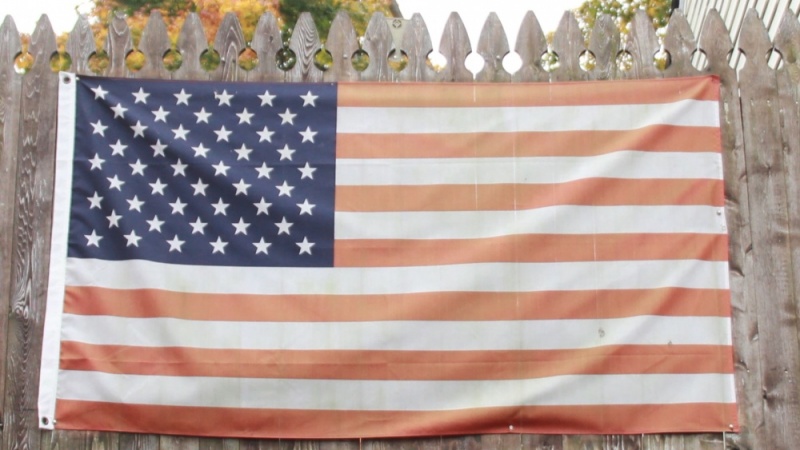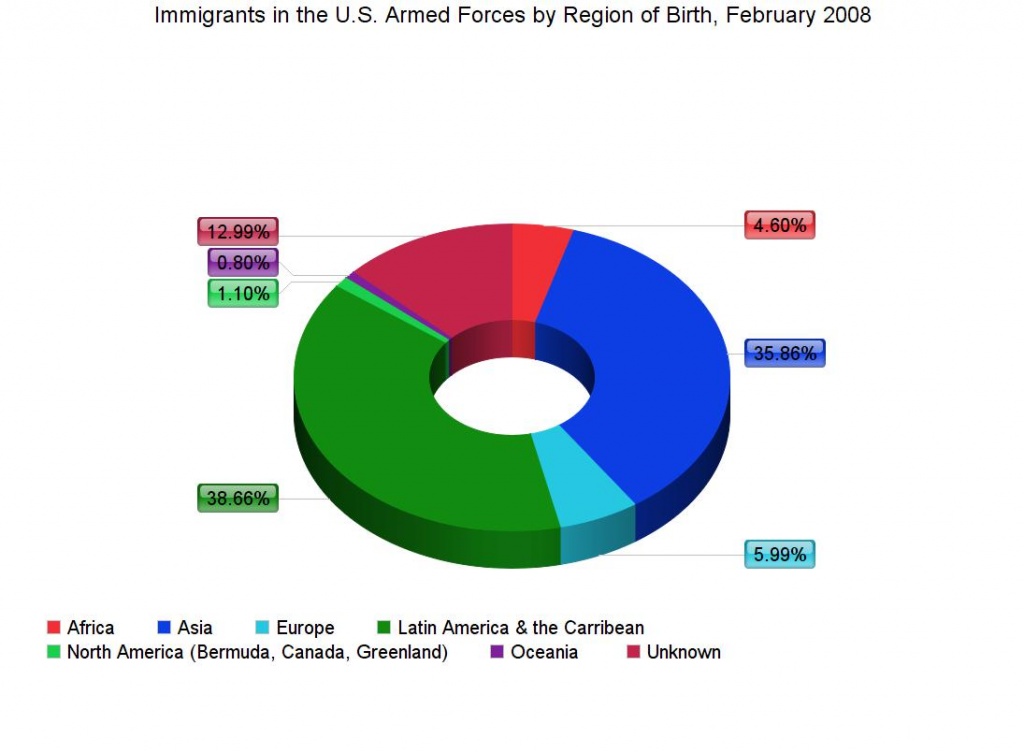
Although the details of Augie Scarino's story are unique, immigrants serving in the
United States military is not.
In fact, according to the most recent data from the Department of Defense, more than 65,000 immigrants, both naturalized and non-citizens, currently serve in the U.S. military. That accounts for nearly five percent of all U.S. service members. These foreign patriots come from all over the world: the Philippines, Mexico, Jamaica, Korea and the Dominican Republic being among the countries most widely represented.

Source: Active Duty Personnel Master File, Department of Defense.
But it's not just that immigrants choose to serve, their service is increasingly essential to a functioning military and vital to our national security. Not only are immigrants half as likely to dropout of service than their U.S.-born peers, but they also bring language and cultural skills often lacking in U.S.-born service members.
The expertise brought by immigrants is "critical to mission readiness in today's dynamic global environment," then-Secretary of State Leon Panetta said in a 2011 memo. "Our forces must have the ability to effectively communicate with and understand the cultures of coalition forces, international partners, and local populations."
In addition, military recruiters are facing an ever-shrinking pool of qualified U.S.-born recruits. According to the Pentagon, as much as 75 percent of males aged 18 to 24 were deemed ineligible to serve. The reasons for disqualification range from failure to graduate high school to criminal records to health problems, including obesity.
With 1.2 million male immigrants between the ages of 18 and 24, the military is looking to non-citizens to help fill the gap, and has thrown their support behind the DREAM Act in order to increase this pool even further.
While in today's climate foreign-born recruits are becoming progressively fundamental to military operations, the U.S. has a long history of reaching its hand out to these individuals.
Immigrants have borne arms for the United States in every American war since the Revolution. During the Civil War, immigrants, mostly from Ireland and Germany, made up 18 percent of Union service members. And during the immigration boom of the early 20th century, the U.S. military served as a means to integrate new arrivals into the American way of life—naturalizing more than 192,000 immigrant service members during World War I.
What's more is these immigrants have and continue to serve with distinction, receiving all levels of commendations including the Congressional Medal of Honor and the Purple Heart.
I am what I am right now because of America. In other countries none of it.
One Purple Heart recipient is Jesse Baltazar.
Baltazar was born in Manila, Philippines in 1920, and served in three wars for the United States: World War II, Korea and Vietnam. A piece of shrapnel from a Japanese bomb imbedded itself in his leg during the Battle of Bataan on March 15, 1942. Because his military records were lost, it took until 2015 before he was recognized for his wounds.
Today, at the age of 95, he continues to serve as a security advisor with the State Department in Washington D.C.
At the time, all male students were required to be members of the Reserve Officers' Training Corp (ROTC), and when Baltazar's tactical officer saw him he said, "Do you want to join the Army?" Baltazar said yes, and right there was inducted into the United States Army Forces in the Far East, or USAFEE, an all-Filipino branch of the US Army.
By the first of January 1943, Baltazar was in Bataan fighting the Japanese. Without weapons and proper uniforms he traded his rations of beer and cigarettes for a .45 caliber pistol and picked up a helmet from a fallen soldier.
After he was wounded, he was sent to an open-air jungle hospital for surgery where he remained until April 9, 1943 when 76,000 American and Filipino soldiers surrendered and began the Bataan Death March.
An estimated 7,000 to 10,000 U.S. and Filipino military personal and civilians would lose their lives on the 66-mile trail from Mariveles, Bataan, to San Fernando, Pampanga.
Baltazar endured for three days. As he settled in for the night on the third day, a local fisherman approached his encampment.
"Who wants to escape?" the fisherman whispered. "We'll take you out of here."
Baltazar raised his hand and for his last $5 the fisherman hid him in the back of his boat and they rode for two hours through the swamps to freedom.
Once back in Manilia, Baltazar continued his service with USAFFE until he was discharged in 1945.
The American dream. You dream to be somebody, then you be some body and you can attain it. Nobody can stop you from doing it.
Before enlisting in the Army, Baltazar dreamt of becoming a pilot. But not just any pilot, an American pilot.
He heard the only way to get to the United States was through a student visa. So he applied for the aeronautical engineering program at the California Institute of Technology. Once his acceptance letter arrived, he went straight to the American consulate.
Eighty dollars bought him passage on a cargo ship headed for San Francisco, but once he arrived his plans suddenly changed. While staying at a hotel before heading to his new university in Pasadena, Calif., Baltazar saw a sign in a store window on Market Street.
"Uncle Sam Needs You," it read.
"That's my chance," he said, and the next morning went to the recruitment office and enlisted in the Air Corp of the United States Army. Three years later, he became the first native Filipino commissioned in the United States Air Force.
In 1950, he was assigned to the Air Force Office of Special Investigations in Korea where, due to his fluency in Russian and Chinese, he was assigned to interrogate refugees. After 20 years in the Air Force, he was discharged in 1966, but soon reenlisted with the United States Agency for International Development to aid his adopted country in the war in Vietnam.
He served in Vietnam until 1970 when he began working for the State Department.
Music: "Idea" by Kai Engel, "Americana" by Kevin MacLeod, "Slow Motion" by Bensound


 Foreign Patriots
Foreign Patriots Becoming a Dish
Becoming a Dish Borderlands
Borderlands From Russia With Hate
From Russia With Hate